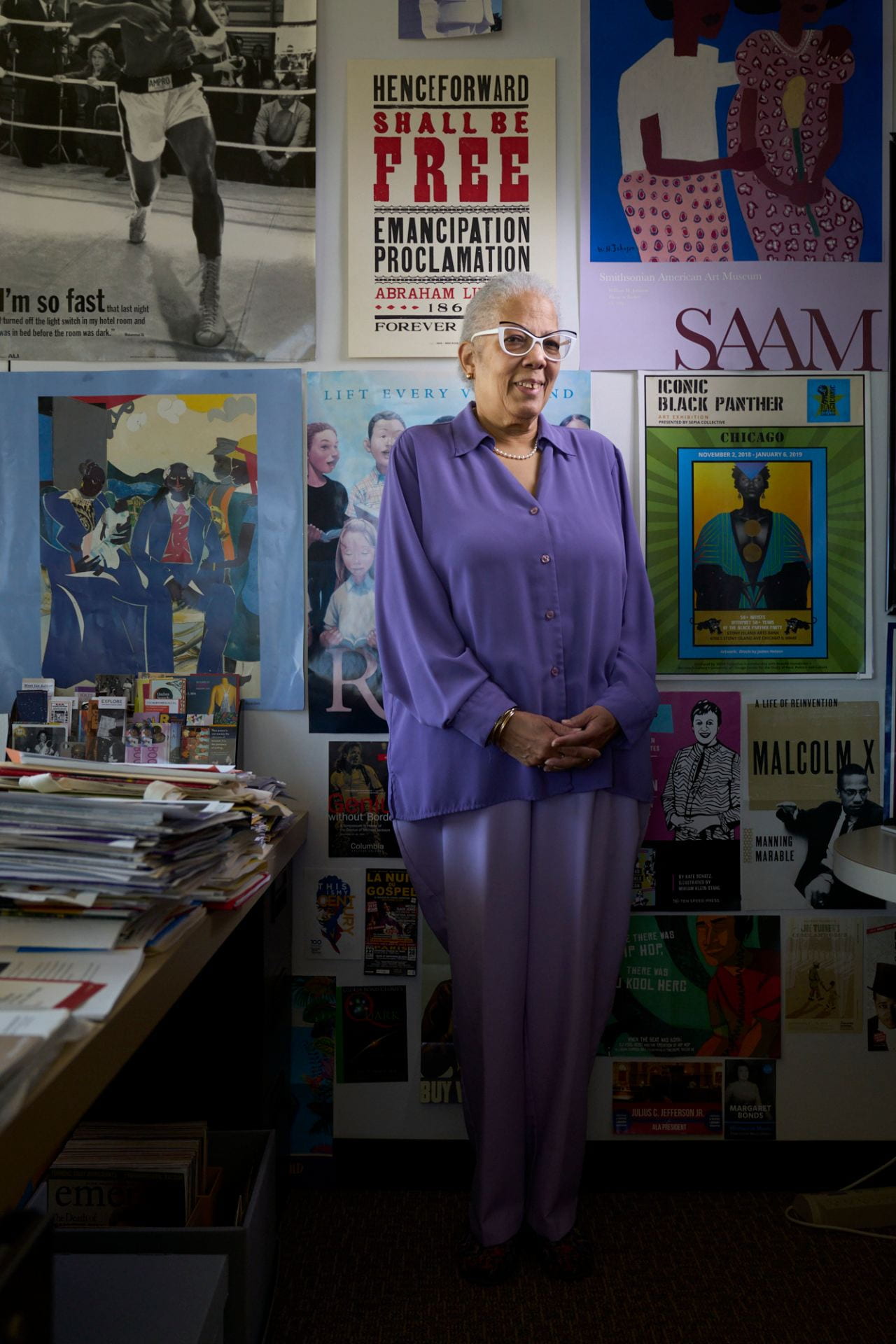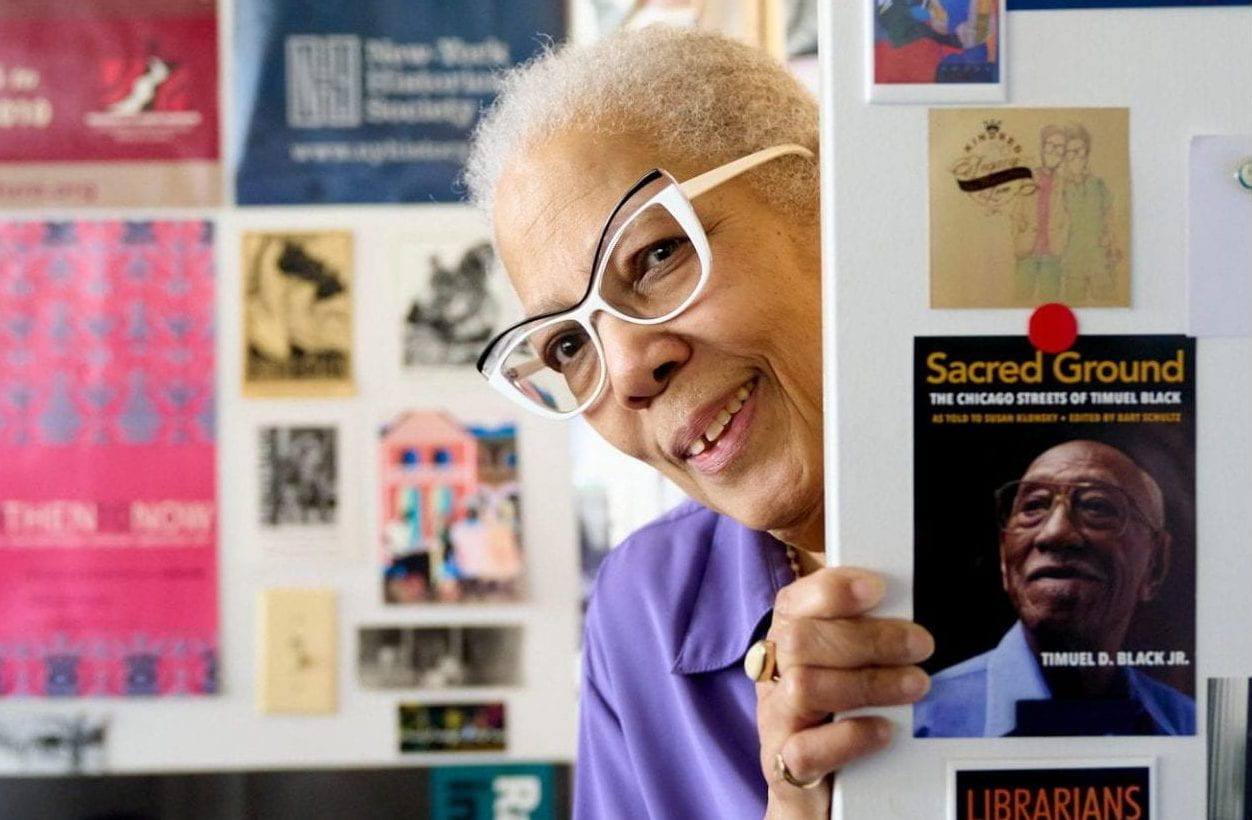On Kathleen Bethel’s first day as a student at Elmhurst College in suburban Chicago, someone in a passing car shouted a racial epithet at her and threw a soda can that just missed her head.
“I remember being mad, being so mad,” Bethel said. “That anger led me to pursue Black studies. Whatever class I was in, I would make the assignments about Black studies.”
Bethel went on to make Black studies the heart of her career as well. She retires later this year after 41 years as Northwestern’s African American studies librarian. The University’s “Af Am” department was only 10 years old when Bethel became librarian in 1982, so she set about single-handedly building the collection and would become a research consultant to generations of scholars.
She also created a welcoming space in the library for Black students, first in a windowless shared office in the former reference department, then in a second-floor private office with spectacular views of Lake Michigan.
“Students knew my office as a safe Black space,” Bethel said. “They would pop in, saying, ‘I don’t need anything. Just let me sit here for a moment,’” she recalled.
The posters displayed in her office captured four decades of lectures, plays, exhibits, and other events relevant to the Black student community—a graphic archive of campus culture. “I’ve done everything I can to document the Black experience here,” she said, noting that students would often lose themselves reading all the material on her walls.
“Kathleen’s name is mentioned by alumni across the globe when they reminisce about their time on campus,” wrote Jeff Sterling and Lauren Lowery in their 2018 book, Voices and Visions: The Evolution of the Black Experience at Northwestern University. They recounted how a student who came into Bethel’s office once told her, “This is the Blackest space I’ve seen on campus. I love it!”
Librarianship is the ultimate expression of Bethel’s interest in Black history and well-being, but she had at first dreamed of becoming a lawyer. Swayed by several aunts who were librarians—and her own sense of unreadiness for law school—she saw training as a librarian as a potential entrée to the legal profession. But before long, she fell for librarianship outright.
After Elmhurst, Bethel worked at Chicago’s Newberry Library and Maywood Public Library and earned her master’s in library science at Dominican University. Next, she landed a librarian role with Johnson Publishing Company—home of the then highly influential Ebony and Jet magazines. Then in 1982 came the opportunity at Northwestern, where all her interests came together.
“It was just the beginning of seeing white colleges and universities having Black studies and building library collections specifically for it,” she said. The field was taking shape before her eyes, and she was able to take part in charting its course at Northwestern. “During my time, libraries were switching the terminology from Negro to African American,” Bethel said. “I was changing the card catalog a lot in the 1980s.”
Bethel earned a master’s degree in history at Northwestern and pursued various on- and off-campus professional development opportunities over the years. A Fulbright Library Fellowship took her to South Africa’s University of KwaZulu-Natal in 1996, and she studied African American museums as an Alice Kaplan Institute for the Humanities library fellow. She was a 14-year member of Chicago’s DuSable Black History Museum and Education Center’s board of trustees and has worked closely with the HistoryMakers founder Julieanna L. Richardson. When Richardson suggested interviewing Bethel for the project—a digital archive of interviews, biographies, and archival photography for more than 3,300 influential Black Americans—Bethel said, “I was kind of leery and surprised. I’m not sure I was a history maker; I was just a history worker.”
When asked whether her 41 years at Northwestern helped create more welcoming conditions for Black students and Black scholarship at the University, Bethel paused before replying.
“I’d like to think so,” she said. “But there’s this phrase from my youth: The struggle is never-ending. We can’t say that racism, sexism, ageism, all of these things don’t apply here anymore.”
Bethel’s colleagues, however, are emphatic about her positive impact, especially as an agent for change. Former dean of Libraries Sarah Pritchard, who retired in 2022 after 16 years at Northwestern, first met Bethel when they both served in American Library Association governance roles early in their careers. She remembers Bethel as an influential voice in the transformational social and campus movements of their times.
“Kathleen has had an enormous impact,” Pritchard said. “She energetically expanded the role of a librarian through her commitment to the academic field of African American studies. She excelled in direct engagement with collections, student services, faculty research, and campus policies. She really went beyond that through her work in many national organizations for librarianship and for historical studies. She has been a brilliant campus citizen of the highest order.”


